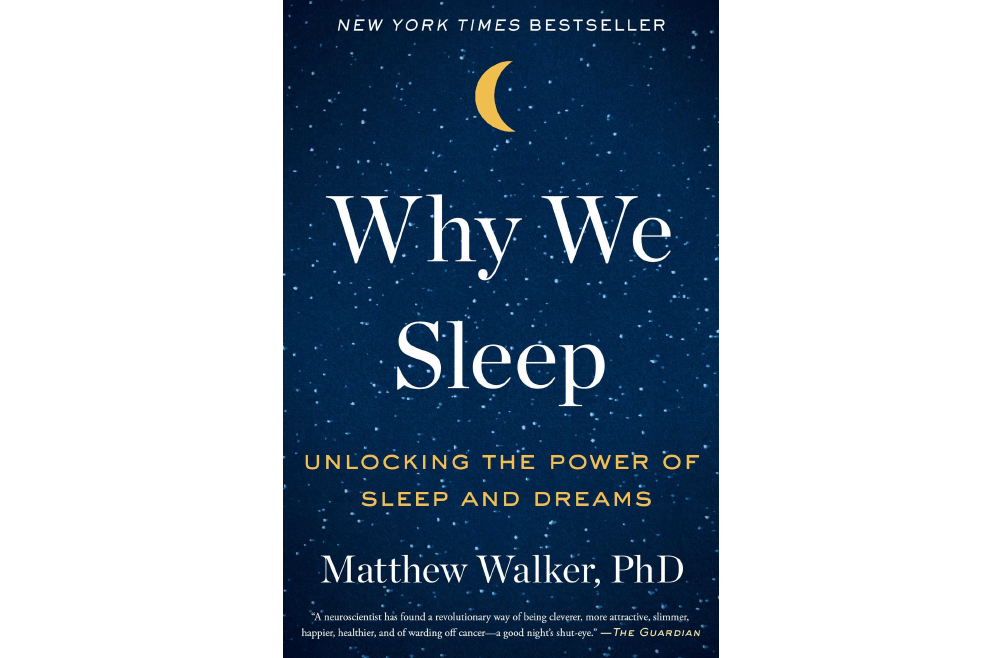Why We Sleep by Matthew Walker, PhD
Book Notes and Takeaways via Duncan Kelm
The absolute fact is the shorter your sleep each night, the shorter your life span
- “I’ll sleep when I am dead” is a mantra that will almost assuredly shorten your life
Two thirds of adults in the developed world fail to obtain the recommended eight hours of sleep
Sleeping six or seven hours demolishes your immune system and doubles your risk of cancer
Too little sleep will swell your appetite and often people will overeat
Every species that has ever existed sleeps
Sleep helps recalibrate our emotional brain circuits, allowing us to navigate next-day social and psychological challenges
Sleep is the single most effective thing we can do to reset brain and body health each day
There are two physical aspects to sleep
- Your twenty-four rhythm also known as circadian rhythm
- Adenosine or sleep pressure
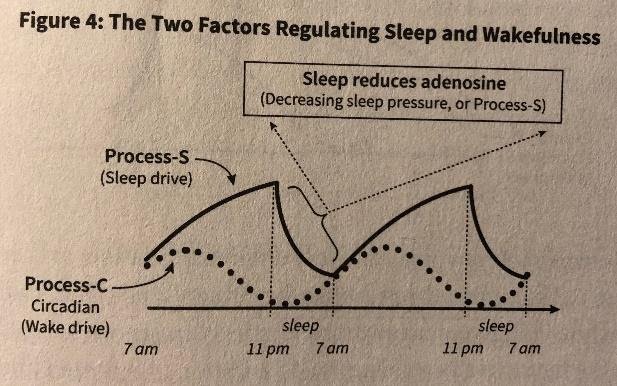
Circadian rhythm helps determine when you want to sleep and when you want to be awake
- Peak circadian rhythm is early afternoon
- More Olympic records have been broken at this time than any other
- Circadian rhythm is approximately twenty four hours, but nor precisely
- Twenty four hours and fifteen minutes is closer to the normal circadian rhythm
Any signal from the brain to sleep is termed zeitgeber
Circadian rhythm peaks and troughs can be very different from one person to the next
- Peak wakefulness arrives at different points in the day
- Those who reach this state earlier are generally dubbed “morning types”
- The alternative tend to be dubbed “night owls”
- Night owls tend to be worse off because society forces them to begin earlier even though then may not fall asleep until later
Melatonin is a hormone that is released into the brain around dusk
- The analogy of melatonin is that if the night of sleep is the hundred meter race, melatonin is the voice saying “runners take your mark”
- Melatonin is not a powerful sleeping aid
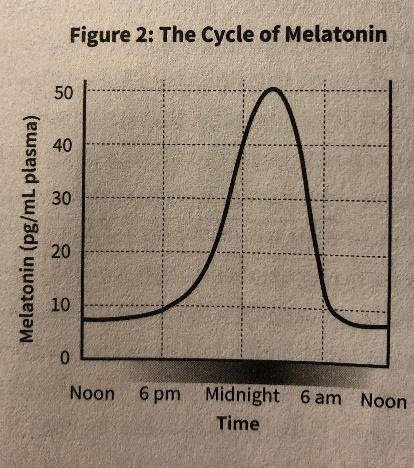
- For every day you are in a different time zone an hour of change balances out for sleep
- It is always harder to acclimate to a new climate when traveling east
Adenosine is a chemical that builds in your brain that demands sleep to be removed, also known as sleep pressure, it will start to impact faculties and continuously build until sleep is achieved
- You can artificially mute the sleep signal of adenosine by using a stimulant like caffeine
Caffeine works against adenosine by latching on to receptors in the brain and temporarily inactivates these receptors relieving sleepiness; it has not gone away, only been reduced
- Levels of caffeine peak approximately thirty minutes after oral administration
- When receptors become vacant by way of caffeine decomposition, adenosine rushes back and smothers the receptors
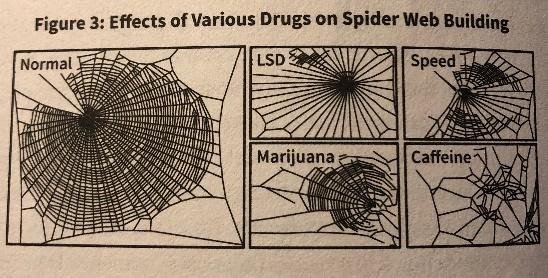
If you feel you could fall asleep mid-morning, it is likely you are not getting enough sleep, or the quality of sleep is insufficient
Your brain is still capable of logging time with remarkable precision while asleep
- Think about how you can wake up two minutes before your alarm goes off
- It flies below consciousness, surfacing when needed
In dreams you continue to have a sense of time
- More often than not, dream time is stretched out and prolonged relative to real time
Humans cycle through two types of sleep throughout the night
- Rapid-eye-movement (REM)
- And Non-rapid-eye-movement (NREM)
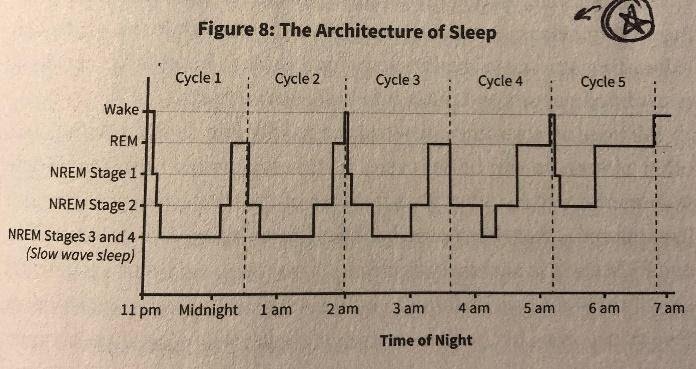
REM and NREM play out a push and pull throughout the night
REM is when you dream
- From seconds before you enter the dreaming phase your body becomes completely paralyzed
- Eliminating muscle activity during REM prevents you from acting out your dream and harming yourself
- You are in a tailored physiological straightjacket
- The brain paralyzes the body, so the mind can dream safely
Different animals require different durations of sleep
- For example elephants need half as much sleep as humans
- The relationship between the size of the nervous system, the complexity of the nervous system, and total body mass can be an indicator
The brain throughout a night of sleep will consume a far larger amount of NREM sleep versus REM sleep
It is very important to note, that you can never “sleep back” that which you have previously lost
Naps for forty-five minutes to one hour mid-day is healthy and can be the key to longevity
- Biphasic sleep is one thing Walker is big on, or significant sleep twice in 24 hours
- Powernaps can work well, , but only if you get a full night sleep
Humans are exclusively terrestrial sleepers, we only go to sleep lying flat on the ground
REM sleep exquisitely recalibrates and fine-tunes the emotional circuits of the human brain
- REM sleep increases our ability to navigate socioemotional and covert facials signals
- REM sleep also fuels creativity
NREM sleep helps transfer and make safe newly learned information into long-term storage sites of the brain
REM sleep unlocks the subconscious which can help us solve solutions and make connections we did not see during the day
- Solving problems in your sleep is very common as your brain is free to work unencumbered
- We can awake the next morning with new solutions to previously intractable problems or even be infused with radically new and original ideas
The older a child gets, the fewer, longer, and more stable their sleep bouts become
- The amount of total sleep gradually declines from birth onwards, all the while becoming more stable and consistent
A six month old infant has a 50/50 NREM and REM timeshare
A five year old will have a 70/30 split NREM/REM
- Circadian rhythm of young children run on an earlier schedule which is why the early school days can be so detrimental to learning
- Teenagers are the same and tend to be more “night owls” genetically as they are growing
- Teenagers need more sleep than adults
An adult will have an 80/20 split NREM/REM
Once you reach your forties, quality and quantity of NREM sleep declines
The older we get, the more frequently we wake up throughout the night
- The chief reason is a weakening bladder
Seniors generally experience a regression in timing sleep wise, opting to sleep earlier and longer
Exercise can help solidify good sleep
The same parts of our brain that ignite healthy deep sleep at night are the very same areas the degenerate, or atrophy, earliest and most severely as we age
Poor sleep is one of the most underappreciated factors contributing to cognitive and medical ill health in the elderly
It is common that older adults may need more sleep than they can naturally generate
Sleep is the universal health care provider
- Whatever the physical or mental ailment, sleep has a prescription it can dispense
Each stage of sleep, offer different brain benefits at different times of night
Sleep restores the capacity for learning, making room for new memories
The memory refreshment has been found to be in stage 2 of NREM sleep
- Specifically the short powerful bursts of electrical activity called sleep spindles
- Sleep spindles in stage 2 of NREM sleep move memories from the short term repository (hippocampus) to the long-term secure vault (cortex)
- By filing these memories overnight during this process, yesterday’s experiences become stored, and room for new memories is created
- Sixty to Ninety year olds are unable to generate as many sleep spindles (roughly 40%) less which explains why some memory faculties go away over time with aging adults
We obtain most of our deep NREM sleep early in the night, and much of our REM sleep, and lighter NREM sleep, late in the night
- NREM provides superior memory retention savings relative to late-night REM-rich sleep
In a study, students were told what was important and unimportant, scientists were able to approve that the unimportant information was deleted during the sleep process
- Sleep does not offer a general preservation of all information; instead, sleep is able to offer a far more discerning hand in memory improvement, one that picks and chooses what is and isn’t important
The number of memory spindles generated in the last two hours of sleep are where most of the recovery and memories are made
- Cutting short on this last two hours of sleep can seriously limit your knowledge and problem solving and physical regeneration
Obtain anything less than eight hours of sleep a night, and especially less than six hours a night, and the following happens:
- Time to physical exhaustion drops by 10-30%
- Aerobic output is significantly reduced
- Faster rates of lactic acid buildup
- Reductions in blood oxygen saturation
- Increase in blood carbon dioxide
- Ability for the body to cool itself during physical exertion through sweating
Momentary lapses in concentration are called micro-sleeps
- This can be incredibly dangerous if occurring when behind a wheel
Ten days sleeping at six hours of sleep a night is the same as going without sleep for twenty-four hours straight
- People consistently underestimate their degree of performance disability through shorter sleep cycles
With chronic sleep restriction an individual will acclimate to their impaired performance, lower alertness, and reduced energy levels
After being awake for nineteen hours, those who were sleep deprived were as cognitively impaired as those who were legally drunk
- After sixteen straight hours of being awake, the brain starts to fail
- Humans need more than seven hours of sleep each night to maintain cognitive performance
Insufficient sleep also determines relapse rates in numerous addictions and disorders
- Lack of sleep is a casual trigger of a psychiatric episode of mania or depression
Memories learned while sleep-deprived are forgotten far more quickly in the hours and days thereafter
- If you do not sleep well the very first night after learning something, you lose the chance to consolidate those memories even with lots of “catch-up” sleep thereafter
Amyloid is a deposit in the brain that can clutter and make things slower for people
- During the night, the amyloid is cleaned by the glymphatic system
- The less deep sleep you have the less the amyloid is removed from the brain
- The last two hours of sleep does 20 times the clean up
Every major system, tissue, and organ of your body suffers when sleep becomes short
Adults forty-five years or older who sleep fewer than six hours a night are 200 percent more likely to have a heart attack or stroke during their lifetime, as compared to those sleeping eight hours a night
For as long as the state of insufficient sleep lasts, and for some time thereafter, the body remains stuck in some degree of a flight-or-flight state
There are a frightening number of heart attacks that occur the following day after daylight savings
The less you sleep, the more likely you are to eat, it will stimulate appetite and increase your desire to snack
- Your body is 40 percent more likely to absorb glucose when you don’t have sleep
Sleep can fight against infection and sickness by deploying all manner of weaponry within your immune arsenal
Cancer cells are 70 percent more likely to occur when getting four hours of sleep each night or less
Tumors were far more aggressive in sleep-deficient animals
REM is really the only time you dream
- REM is a state characterized by strong activation in visual, motor, emotional, and autobiographical memory regions of the brain
- Dreams are never a full replay of our waking lives
REM sleep is the only time in a twenty-four hour period when your brain is completely devoid of this anxiety-triggering molecule (noradrenaline)
- REM sleep is absolutely necessary to heal emotional wounds
- REM sleep also plays a critical role in the development of language
Dreaming takes the approach of interrogating our recent autobiographical experience and skillfully positioning it within the context of the past experiences
The relationship between sleep and mortality is not linear, more than nine hours of sleep can cause negative issues as well
Five things to change how we sleep
- Cut constant electric light as well as LED light especially right before you sleep
- Keep your body temperature cool
- Avoid caffeine later than noon
- Avoid alcohol
- Keep to a very consistent sleep cycle, same time every day regardless of day or night
The financial consultants at Arrow Point Wealth Management are registered representatives with and securities and advisory services offered through LPL Financial, a registered investment advisor, Member FINRA/SIPC
This material has been prepared for informational purposes only, and is not intended as specific advice or recommendations for any individual. All performance referenced is historical and is no guarantee of future results.

